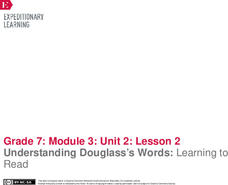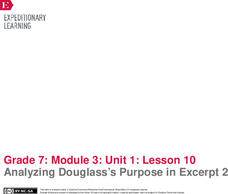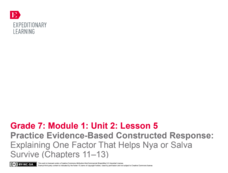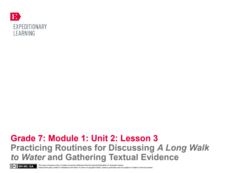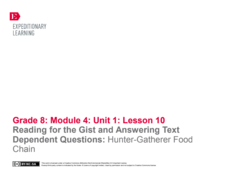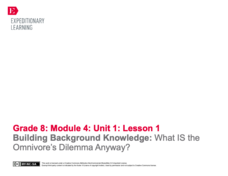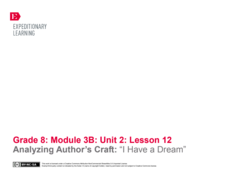EngageNY
Reading for Gist: “Middle Ages” Excerpt 2
Read and repeat. Scholars repeat the strategies for digging deeper into text from instructional activity two. This time they focus on Middle Ages Excerpt 2. Learners write unfamiliar words in the word catcher and use details from the...
EngageNY
Reading for Gist: “Middle Ages” Excerpt 1
Dig deep. Scholars dig deep for meaning while reading Middle Ages Excerpt 1. They begin by finding unfamiliar words and adding them to a word catcher. Pupils then take a close look at adversity in the text and complete an anchor chart.
EngageNY
Introducing the Process for Close Reading: Meeting Frederick Douglass
To learn more about Frederick Douglass, class members complete close reads of excerpts from Narrative of the Life of Frederick Douglass. They complete a close reading guide and questions for each excerpt. Pupils then add to the...
EngageNY
Mid-Unit Assessment, Part 2: Analyzing an Excerpt from the Narrative
Writing is a craft. Scholars take a mid-unit assessment where they answer questions about the author's purpose and craft in Douglass's narrative. After completing the assessment, pupils look continue with their independent reading text.
EngageNY
Understanding Douglass’s Words: An Escape Attempt
Make a match! Scholars play a matching game after looking at excerpt five from Narrative of the Life of Frederick
Douglass. Learners match types of figurative language with example sentences, and add to their powerful language word wall...
EngageNY
Bringing Douglass’s Words to Life: The Fight with Covey
Readers have the opportunity to bring the words from an excerpt of Narrative of the Life of Frederick
Douglass to life. They use strategies from the Storyteller’s
Toolbox anchor chart as a guide and then work in pairs to prepare their...
EngageNY
The Storyteller’s Toolbox and Excerpt 4 First Read
It's story time! Scholars take a look through the eyes of a storyteller as the teacher reads aloud The People Could Fly. They also listen as the story is played on video. Learners then answer questions about the reader's facial...
EngageNY
Analyzing Powerful Language: Learning to Read
The power of a word. Readers learn the importance of word choice in shaping a text by using a Powerful Language T-chart to separate strong words and phrases from those that are more bland. They then complete a third read and question set...
EngageNY
Understanding Douglass’s Words: Learning to Read
How is a sentence like the human body? Scholars think about the comparison as they view an image of the human anatomy and begin to complete an Anatomy of a Sentence anchor chart. They review roots, prefixes, and suffixes and then begin...
EngageNY
Analyzing Douglass’s Purpose in Excerpt 2
Learners revisit Plantation Life to focus on Douglass's purpose and choices he made for writing the text. They complete text-dependent questions, an analysis note catcher, and finalize their thoughts by sharing out with the class.
EngageNY
Launching the Module: Identity and Transformation, Then and Now
Identify yourself! Learners listen to Nadia’s Hands read aloud before working in their identity journals to answer prompts relating to the story. They then look at identity using two recording forms Who Am I on the Outside? and Who Am I...
EngageNY
Establishing Routines for Discussing A Long Walk to Water (Chapter 6)
Middle schoolers use a reader's dictionary to locate words they do not know in chapter 6 of A Long Walk to Water. They then turn attention to gist and work on a Salva/Nya anchor chart to record what happens to the characters. Finally,...
EngageNY
Practice Evidence-Based Constructed Response: Explaining One Factor That Helps Nya or Salva Survive (Chapters 11–13)
Class members work through a model lesson in answering constructed response questions. They begin viewing an Evidence-Based Constructed Response sheet and then watch the teacher model. Readers then work as a group to answer a question...
EngageNY
Practicing Routines for Discussing A Long Walk to Water and Gathering Textual Evidence
Welcome a new teacher (or two)! While most of the class works on the survival anchor chart, one pair begins the Salva/Nya chart and uses it to teach the class. Each day, scholars switch roles, giving every pair a chance to teach their...
EngageNY
Reading for the Gist and Answering Text Dependent Questions: Hunter-Gatherer Food Chain
Readers use sticky notes and a close reading guide to identify the gist of "My Pig" on pages 240–245 of The Omnivore's Dilemma. After reviewing their thoughts with peers, they answer text-dependent questions about the section.
EngageNY
Reading for Gist and Answering Text-Dependent Questions: Local Sustainable Food Chain
Readers use sticky notes and a Reading Closely: Guiding Questions handout to record the gist of a different section (pages 161-166) in The Omnivore’s Dilemma. They then pair up and share their ideas. To end the lesson, readers complete...
EngageNY
Reading for Gist and Answering Text-Dependent Questions: Industrial Food Chain
Where do humans fall on the food chain? Scholars read about the Industrial Food Chain in The Omnivore’s Dilemma sections. They use word catchers to record unfamiliar words as they read and place sticky notes in the margins to annotate...
EngageNY
Building Background Knowledge: What IS the Omnivore’s Dilemma Anyway?
What's the best thing on the menu? Scholars enter the room, complete a gallery walk of menus to choose a food to pretend to order, and then discuss how they made the decision. Next, they read The Omnivore's Dilemma and relate their...
EngageNY
Analyzing an Author’s Craft: Carlotta’s Journey to Justice
What's an appropriate response? Scholars open the text A Mighty Long Way to see how Carlotta responded to racism, discrimination, and abuse. They work in pairs to answer questions regarding her responses. To finish, they use the Dignity...
EngageNY
Analyzing Author’s Craft: “I Have a Dream”
It's time to make some connections! Scholars complete a close reading of the speech I Have a Dream by Martin Luther King, Jr. They use an I Have a Dream Speech Gist Note-catcher, and I Have a Dream text-dependent questions to guide their...
EngageNY
Analyzing Theme: The Invisibility of Captives during WWII
Can you see me now? Scholars discuss two definitions of invisibility and then connect the definitions to text evidence related to Louie's invisibility in Unbroken. Readers turn their attention to The Life of Miné Okubo and record text...
EngageNY
Introducing a Thematic Concept: Becoming Visible Again after Captivity
Share your thoughts. Scholars use Think-Pair-Share to answer questions related to Louie in Unbroken. The class completes the Becoming Visible Again anchor chart to understand the text's theme better. They write an example of Louie...
EngageNY
Introducing a Thematic Concept in This Unit: The “Invisibility” of Captives during WWII (pages 170-181)
Scholars discuss the phrase identity is erased and how it relates to the theme of invisibility. They use their Understanding Invisibility note catcher to identify how invisibility may occur within a person. They then work on a Gathering...
EngageNY
Analyzing a Thematic Concept: The Invisibility of Captives during WWII (Pages 182-188)
Readers complete a word web-based on the word dignity. They use their Understanding Invisibility note catcher to discuss how dignity relates to the theme of invisibility. After group discussion comparing invisibility and loss of dignity,...










